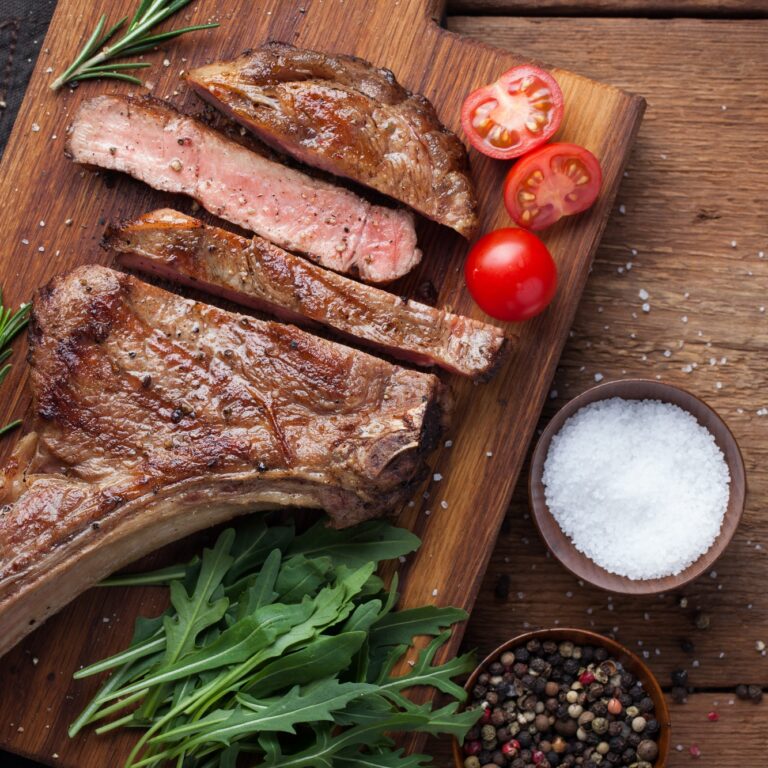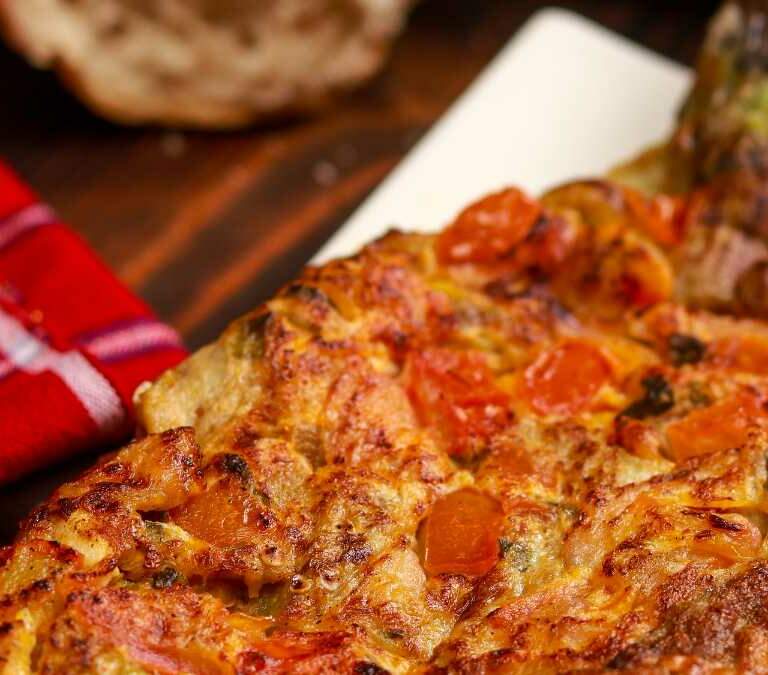
What the Heck is Kombucha Tea and WIIFY?
You probably heard me mention Kombucha a couple of times (or more, lol). It’s this amazing probiotic drink (along with kefir) that helped me manage my acid reflux before. So today, my friend Jannah of Kombucha.ph, expert on all things Kombucha, is going to introduce you to this healthy probiotic drink. Read her guest post below and be amazed!
What the Heck is Kombucha Tea?
by: Jannah Abueza
My interest with kombucha started when a client introduced me to it. Ever since then, I got hooked. I bought different types of teas, hoarded bottles, looked at trash cans to look for reusable bottles, tried fresh fruits, dried fruits, made bread using kombucha, use kombucha vinegar in foods, made kombucha as hair rinse and more “craziness”.
You may have heard about kombucha from your favorite Hollywood celebrities. Gwyneth Paltrow swears by it. Shailene Woodley tells the press she makes it. Lady Gaga and Lindsay Lohan are often seen with it in their hands. Or perhaps you’ve seen many #yogisofinstagram post a selfie while sipping a bottle of it. Kombucha has been gaining popularity amongst foodies in the Western side of the world. In the Philippines, it is relatively new.


What’s in it for me?
Kombucha is a beverage made using camelia sinensis or tea and some herbal teas like hibiscus tea, butterfly pea tea and elderberry tea, water and sugar. The concoction is fermented for a few days to weeks and turns into an acidic, tangy, a little sweet and effervescent drink. It is full of probiotics, B vitamins and enzymes. Kombucha tea helps in maintaining balanced and healthy gut flora.
These are the bacteria strains that have been found in Kombucha tea:
- Acetobacter xylinum
- Acetobacter xylinoides
- Acetobacter aceti
- Acetobacterpasteurianum
- Gluconobacter bluconicum
These are the yeast strains found in kombucha tea:
- Schizosaccharomyces pombe
- Yeasts originating from Apiculatus
- Saccharomycodes ludwigii
- Pichia fermentans
- Mycoderma
- Yeasts originating from Torula
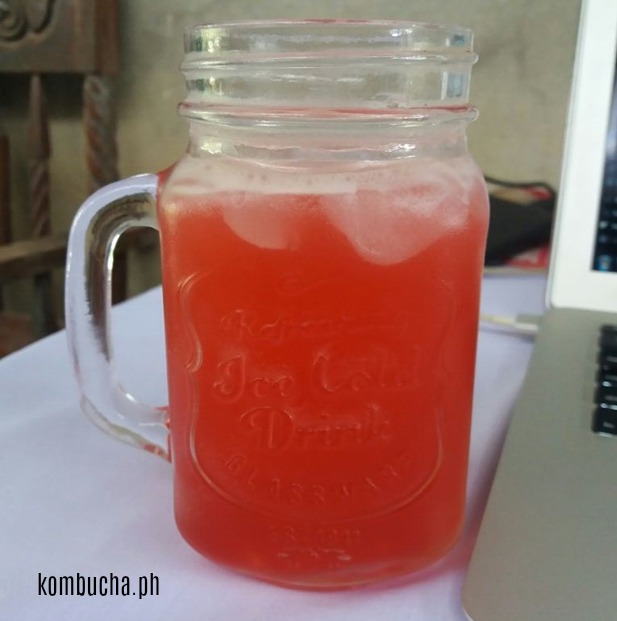
Benefits of Kombucha Tea
- Detoxifies the liver: The acetobacter bacteria strains in Kombucha tea produce acetic, gluconic and lactic acids that help in detoxifying the liver.
- Boosts energy: Kombucha tea has B Vitamins and enzymes that boost energy.
- Boosts immune system: Tea is rich in antioxidant called Polyphenols that grow in number when fermented using kombucha. This antioxidant helps in boosting your immune system.
- Improve joint health: Glucosamines found in kombucha tea helps in improving joint health. Kombucha Kamp surveyed her website readers and customers and reported 51% of them has improved their joint health once they started drinking kombucha tea.
- Improve digestive system: Probiotics has been proven by science time and again to aid in moving food through your gut.
- Promotes hair growth, hair regrowth, hair color retention: de surveyed kombucha drinkers and they reported 8% Better condition of hair and nails 4% Regrowth of hair 7% Restoration of gray/white hair to original color.
How to Make Kombucha Tea (The first fermentation)

Ingredients:
(Makes 1 gallon)
- 1 live kombucha SCOBY
- 1 cup of brewed kombucha tea (starter liquid)
- 1 cup of white sugar
- 2 tablespoons of loose leaf tea or 6-8 tea bags (plain green/black/white, organic is preferred)
- 16 cups of water
Equipment:
- A glass jar
- Non-metal spoon
- Breathable cover (coffee filter, cheesecloth, or clean handkerchief)
- Rubber band
- A pot
Instructions:
- Simmer 4 cups of water.
- Add in your tea and steep for 8-10 minutes. Do not stir!
- Remove the tea and add in your sugar. Stir until sugar is dissolved.
- Add the mixture to the remaining water in the jar. Stir a little.
- Pour in your live SCOBY and starter liquid to the jar.
- Cover the jar with your preferred breathable cover, secure it with a rubber band and place it in a warm and dry location, away from the sunlight.
- On the 3rd day, taste the mixture. If it is tangy and a little sweet and smells vinegary it is ready to harvest. If not, let it sit for another 12 hours and taste it again. Once you reach the tangy but sweet stage, harvest your kombucha tea but leave the SCOBY and a cup of the tea in to your jar. That will serve as your starter for the next batch. Harvested kombucha tea is now ready for consumption or for flavoring and second fermentation.
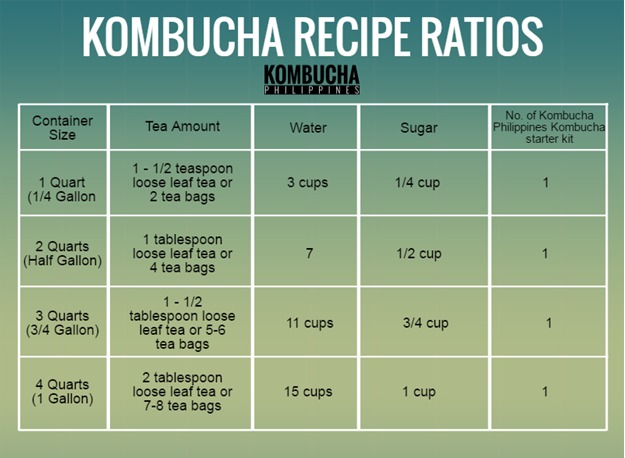
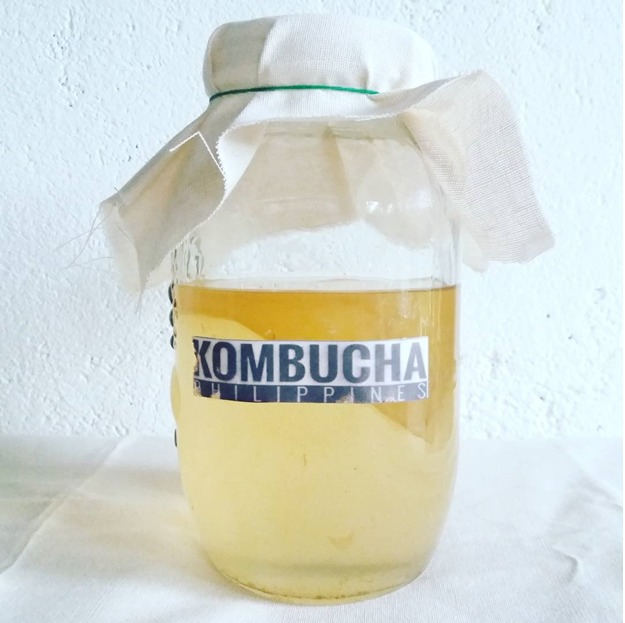
Factors that Affect Kombucha Fermentation and What to Avoid
- Type of culture (your source. I wouldn’t want to get a culture from locations that have issues with cleanliness, airborne diseases, because kombucha is wild fermentation. It gets the yeasts from the environment through the air. )
- Type of tea. Use only plain, unflavored real tea. For herbal teas, only use herbal teas that contain tannins such as butterfly pea tea, hibiscus tea and elderberry tea.
- Type of sugar and amount of sugar used. You can use white or brown sugar. Organic is preferred. Coconut sugar can be used, but only use it when you have other SCOBYs to experiment with.
- Time of fermentation, duration: this depends on your taste. Always make sure the brew smells acidic and vinegary. If it smells like sweet tea, it’s not yet ready for harvesting.
- The fermentation temperature. The ideal temperature for brewing kombucha tea is between 73°-83°F (23°-28°C). Don’t let your kombucha ferment in a place with air-conditioning. Room temperature is fine. Just make sure you taste your brew after 3 days, so it will not turn very sour.
What to avoid
- Direct sunlight
- Using flavored tea. Oils in flavored tea can be detrimental to the health of the SCOBY. If using herbal tea, make sure it contains tannins, i.e hibiscus tea, butterfly pea tea, elderberry tea.
- Using honey as sweetener
- Non-sterile equipment
- Fruit flies
Kombucha tea is delicious and healthy. It is also very easy to make at home. Get kombucha brewing supplies here: kombucha.ph/shop

Hello! I am April
...I don't know exactly what a prayer is. I do know how to pay attention, how to fall down. into the grass, how to kneel down in the grass, how to be idle and blessed, how to stroll through the fields, which is what I have been doing all day. Tell me, what else should I have done? Doesn't everything die at last, and too soon? Tell me, what is it you plan to do with your one wild and precious life?
- That Summer Day. Mary Oliver Tweet






